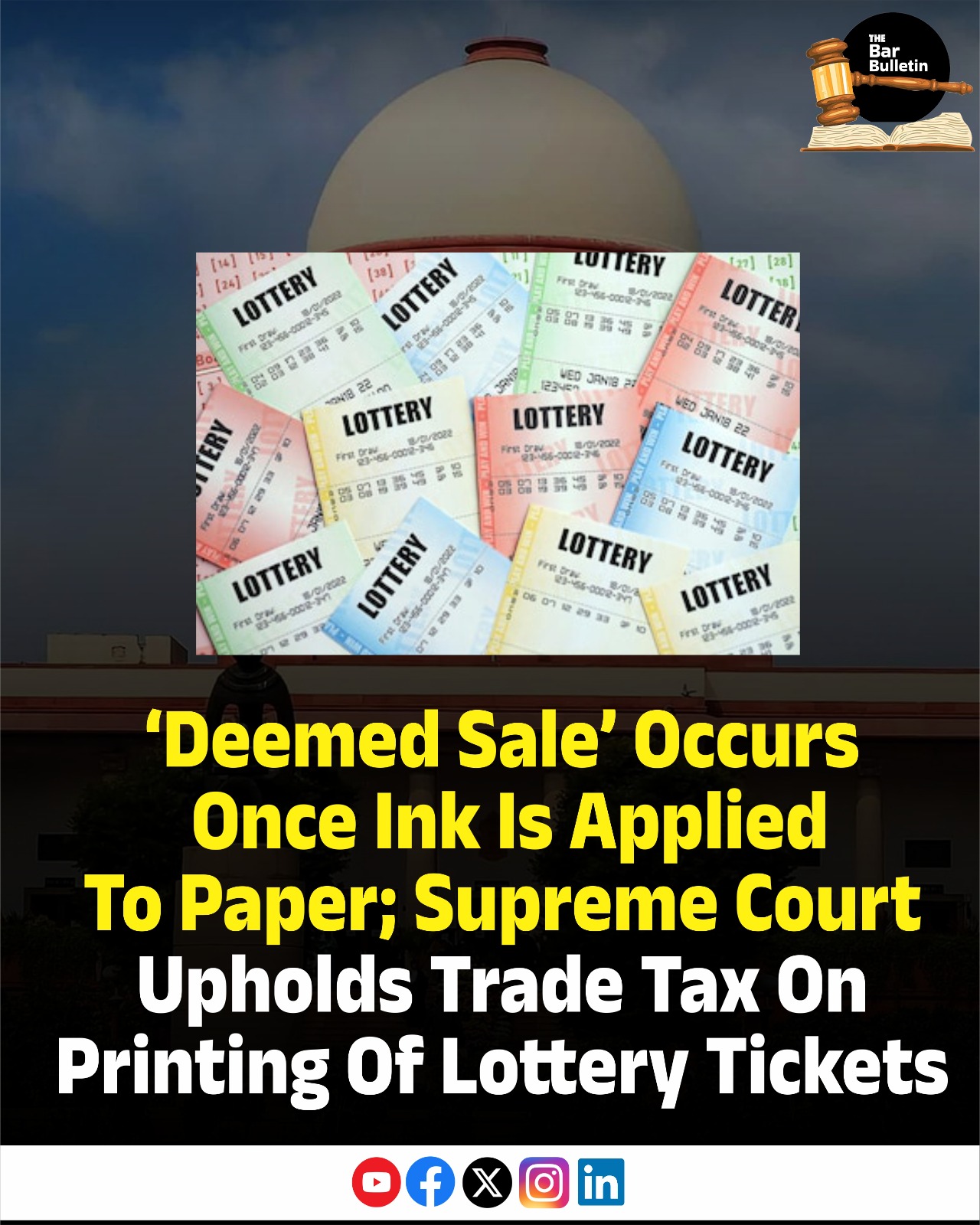The Supreme Court confirmed the liability of the appellant engaged in the business of printing lottery tickets, to pay tax under Section 3F(1)(b) of the Uttar Pradesh Trade Tax Act, 1948, on the ink and processing material. The Apex Court held so, after finding that the three necessary conditions for sustaining such levy under Section 3F(1)(b) which stipulates that: (i) there must be a works contract; (ii) the goods should have been involved in the execution of the works contract; and (iii) the property in those goods must be transferred to a third party either as goods or in some other form, stands duly satisfied in the present case.
Since the appellant has admitted that the contract for printing lottery tickets is a works contract, and the ink, chemical and other processing material were involved in the printing of the lottery tickets, the Court pointed out that there is a transfer of property in the ink and chemicals used in the printing of the lottery tickets.
A Two Judge Bench comprising Justice J B Pardiwala and Justice K V Viswanathan observed that works contract for the printing of lottery tickets refers to the final, tangible printed ticket, and the taxable event, or the “deemed sale“, occurs at the precise moment the ink is applied to the paper. This act constitutes “incorporation in the works”, as the ink and the chemicals (with which the ink is mixed) are involved in the execution of the work contract and become a part of the lottery ticket. In this process, the Bench clarified that there is a tangible transfer of the diluted ink, a composite good comprising both the ink and the processing chemicals.
The Bench explained that the method adopted by the States for determining the taxable turnover relating to works contracts for purposes of levy of sales tax were such that sales tax had to be paid by the building contractors not merely on the value of materials supplied by them in connection with the works contracts but also on the expenditure they had incurred in securing the services of architects and engineers who had supervised the execution of the works, and also on the amount which they were entitled to receive for supervising the execution of the works.
Reference was made to Section 3F(1)(b) of the 1948 Act, to observe that the tax levied is not on the ‘goods’ produced in pursuance of a works contract, i.e., the lottery tickets in the case at hand. The tax under Section 3F(1)(b) is rather on the ‘goods’ which are involved in the execution of the works contract.
In the facts of the present case, the Bench found that the levy of sales tax under Section 3F is on the ink and the processing material used by the appellant in printing the lottery tickets, where the appellant has not provided an item-wise breakdown of such processing material. If the appellant had provided an item-wise breakdown, it would have facilitated in determining whether there was a transfer of property with regard to each such item.
The Bench explained that there is a transfer of property in the ink and chemicals used in the printing of the lottery tickets, and the works contract in this instance is for the printing of lottery tickets, and “the works” refers to the final, tangible printed ticket. The taxable event, or the “deemed sale”, occurs at the precise moment the ink is applied to the paper, and this act constitutes “incorporation in the works”, as the ink and the chemicals (with which the ink is mixed) are involved in the execution of the work contract and become a part of the lottery ticket, and in this process, there is a tangible transfer of the diluted ink, a composite good comprising both the ink and the processing chemicals.
Thus, the transfer of ink and chemicals in their chemically altered form constitutes a valid transfer of property, and therefore, since it is impossible to transfer the ink without also transferring the chemicals it is diluted with, it can be conclusively inferred that the property in both the ink and the chemicals has been transferred, added the Bench.
Briefly, in this case, the appellant, engaged in the business of printing lottery tickets, undertake the work of printing on the paper that was supplied to it by the parties, wherein, the ink and processing material, including the necessary chemicals used in the process of printing, were procured by the appellant itself. The Trade Tax Officer levied trade tax on the value of ink, processing material and packing material used by the appellant for executing the printing work based on Section 3F of the Uttar Pradesh Trade Tax Act, 1948. The Appellate Authority though deleted the tax assessed on the value of ink and other processing materials, however, upheld the levy of tax on the packing materials.
On appeal, the Trade Tax Tribunal set aside the levy of tax on the packaging material, and also upheld the order of the Appellate Authority, which had deleted the tax on the value of ink and other processing materials, including chemicals. When the matter reached the High Court, the order of the Tribunal was set aside, so far as the tax on the value of ink & processing material was deleted. The High Court also opined that the diluted ink was passed onto the customers and thus the ink and the processing material, i.e., the chemical, could not be considered as consumables.
Case Relied On:
Commissioner of Sales Tax v. Matushree Textile Limited – 2003 SCC OnLine Bom 830
Appearances:
AORs Bela Maheshwari, Rohit Singh, and Satyajeet Kumar, along with Advocates Vadlamani Seshagiri, Ananya Kukreti, Poorvi Avtar, P. Khyathi Simantini, and Niraj Kumar Singh, for the Appellant/ Taxpayer
AOR Bhakti Vardhan Singh and Advocate Sandeep Singh Somaria, for the Respondent/ Revenue

